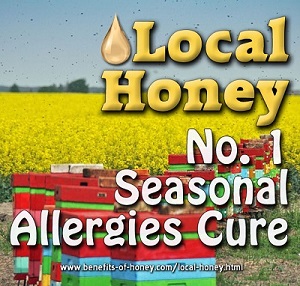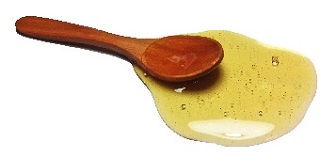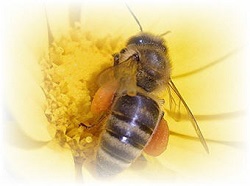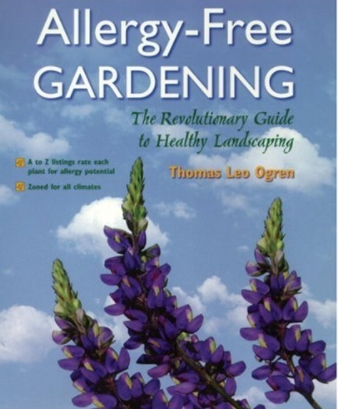honey allergy
Severe Honey Allergy? Share 1st Safety Concerns
Does honey allergy exist? Can honey cause allergic reactions since an amount of pollen from the plants that the honey nectar is gathered from could possibly be found in honey?

I wouldn’t dismiss honey allergies, but as it seems, serious reactions in pollen-allergic patients challenged with honey are rare. Commercially produced honey is filtered and pasteurized (sometimes even diluted with syrup, hence the amount of bee pollen in the honey is probably low.
However, bee products such as propolis, royal jelly, and raw honey (example eating honey straight from honeycomb) probably have to be avoided by people who are sensitive to bee pollens, as nobody could really guarantee its absence in those bee products. And if you are concerned about honey allergy issues, please do consult your doctor.
The safety concern about honey could also have arisen because of the presence of spores that are able to cause a rare deadly disease discovered in 1976, called infant botulism.
While honey allergies cannot be 100% established and we all know that consumption of honey is generally safe for adults, many people actually believe that eating local honey could counteract and treat allergies to these pollens by helping the body to become tolerant of them. That is, honey acts as an immune booster against the allergies. The good effects of this local honey are best when the honey is taken a little bit (a couple of teaspoons-full) a day for several months prior to the pollen season. It is said that the closer the honey is raised to where you live, the better it is.
The author of “Allergy-Free Gardening” says:
“It may seem odd that straight exposure to pollen often triggers allergies but that exposure to pollen in the honey usually has the opposite effect. But this is typically what we see. In honey the allergens are delivered in small, manageable doses and the effect over time is very much like that from undergoing a whole series of allergy immunology injections. The major difference though is that the honey is a lot easier to take and it is certainly a lot less expensive. I am always surprised that this powerful health benefit of local honey is not more widely understood, as it is simple, easy, and often surprisingly effective.”
Thomas Leo Ogren, Allergy-Free Gardening
If you decide to give the local honey a try, consult your physician before use.
A Postscript on Unhappy Readers
After the above article was published in 2007, I received unfriendly emails from a few annoyed readers, who seemed to be offended by the amount of information in this website extolling the benefits of honey and felt that my warning about honey allergy was not hard enough.
These readers reported severe reactions from ingesting even a drop of honey, and these include compulsory vomiting, cramps, asthma, breathlessness, and chest pains. It was said that eating a teaspoon would kill them. A reader even remarked that given the volume of information Benefits of Honey has, he had expected that I would be able to offer more information than anyone on honey allergy. Another warned me that I should not minimise the danger of honey, and that my article implied that honey allergies didn’t exist.
I am no expert in allergies. As per my usual advice to my readers, a medical doctor’s diagnosis should always be sought for any perceived honey allergy.
Nonetheless, we all know that proteins are connected to most food allergies. Honey itself is mainly simple sugars, which are carbohydrates and do not cause allergic responses.
Hence, as explained in the above article, commercially processed honey, which has pollens and other impurities filtered and removed, rarely causes problems. However, unprocessed raw honey may contain residual proteins which are pollens from the plants the bees visited, and pollens are a well-known, established allergen (not honey itself).
For people who are sensitive to pollens, they ought to be very cautious about taking not just honey, but any other bee products which all could possibly contain the pollen allergen. Hence, I do not dismiss “honey allergy”, but I believe, it would not be right to list honey as an allergen alongside with pollen, bee venom (from bee stings), dust, or food-based allergens like peanuts, eggs, milk, nuts, and shellfish.
Final Notes
I’ve decided to remove the post-your comment mechanism on this page after receiving more slamming notes from angry people who felt they were victims of honey allergy (but will continue to let the previous postings stay). I’m not too sure if these people actually realised that if I had tried to deliberately cover up the possibilities of honey allergies, I would not even start this page or post all the unfriendly and warning notes from people who claimed to have a deadly allergy to honey.

I don’t wish to be perceived as ruthlessly promoting the benefits of honey by downplaying its allergic effects for some people. But what constitutes a sufficient warning? Don’t all these postings from honey-allergic people attest to something? And what counts as a serious enough warning? What do we expect when telling others to be careful? Get everyone to stay away from honey just in case one day a fatal allergy strikes? How logical is this?
Take responsibility for everything you eat. Listen to your body, do the research. If you suffer negative effects from a particular kind of food, not just honey, you and all others who have the same experience know best, avoid it in whatever way you can. Do others have to say more?
Postings on Honey Allergy

Honey allergies are real and, in my case at least, it does not matter what kind, where it is from or if it is store-bought, pasteurized, filtered, etc. or what kind of honey (clover, wildflower, alfalfa, etc.) I have had a strong anaphylactic reaction (not stomach upset) from Honey-nut Cheerios, several kinds of plain honey (in restaurants and store-bought,) dust from honey graham crackers, a reaction to honey in a premade pizza crust I bought at the store, and honey mustard at several restaurants. I have also gotten rashes on my hands when I have inadvertently touched a jar of honey in my home that has residue on the outside.
My allergist told me “No one is allergic to honey.” Well, I was tested by the CDC in a battery of tests sent to my doctor and yes, there is an actual honey allergy. Now he also told me that this probably meant I was allergic to bees (I had never been stung) I got stung last week and had no really particular reaction, so apparently in my case, it is just honey! Just wanted to let people know to be careful, not to be rude. I have found honey on labels of foods I would never expect – (see pizza crust above)Thank you for giving us this forum ~ and people – BE NICE!
Susan, United States
19 Jul 2010

I started taking two teaspoons in a cup of tea instead of sugar when I heard it is anti-bacterial and healthy. However, on my second day doing this I started getting sever stomach cramps and felt bloated and nauseas.
At first I did not know what it was but quickly realised that it was the honey. I even feel sick now just smelling honey. This happened from two different brands of honey from a local supermarket.
I never suspected an allergy to honey since I eat Kellogg’s Crunchy Nut almost every morning for breakfast. I am not allergic to anything, well, except now maybe honey. I have not visited a doctor about this though.
Pieter, United Kingdom
26 May 2009
I will like to contribute to this honey allergy stuff. My wife always react violently with acute stomach ache whenever she has the slightest conntact with honey in her food. Infact, she has to be rushed to hospital before the health is restored. It has happened on more than two occassions. But I personally enjoy taking it. I hope my son doesn’t react to it. He is very young (10 month old). I’m scared to give him.
Stephen Adetunji, Nigeria
25 May 2009
I wouldn’t say that I have a severe honey allergy. I have enough of an allergy that I can tell when some sort food product contains honey. My symptoms after eating honey or food products with honey in them are burning of my lips, my ears itch and my throat swells up. Not to the point of closing. I usually take a benadryl as soon as I can. So, if I wish to sweeten anything I use Agave Nectar, which seems to work out pretty well.
Kathleen, United States
9 May 2009
I’ve eaten whole wheat bread my entire life and made a mistake recently of purchasing whole wheat with honey in it. I had a severe allergic reaction. My lips swelled up and my entire stomach and throat burned. I puked my guts out all night and seriously considered going to the hospital but got better after about 7 hours with benadryl.
The allergy exists. And it sucks.
Robin, United States
24 April 2009
Honey allergies are very real. I have a friend who reacted to drinking out of the same water bottle as her son, who had just drunk a honey flavored drink. In fact, this person also reacted to coming in contact with candles made of bees wax!
So its obvious it’s an allergy to the bee proteins that are in the honey and wax. But I an sorry you got so many unfriendly emails. Seems to me, people should know if they are allergic and should just chill out. If a user dies because of a spoon of honey recommended here, wouldnt it be the same when they decided to drink a ‘healthy’ soda? I think the fact that you posted allergies could exist was enough. Do the research people!
I am sorry you got so many nasty emails. People need to take responsibility. Where is Darwin when we need him. Not downplaying anything here, I have plenty of issues, and it is up to ME to have a little awareness.
I suppose they would be happy when all the trees are gone, because all the candybars need to be packaged in boxes the size of ceral boxes to hold all the warning.
Warning – product contains honey which may harm .00312% of the worlds population, especially if there is a bees knee in it.
Warning – product contains peanuts, which may cause you harm if you are allergic to peanuts. Please check with your Health Care provider before consuming.
Warning, this product contains oils which in certain thyroid deficient individuals will cause them to bloat up and look like a McDonalds hamburger edict.
Warning: This product contains wheat, milk, which some people cant handle.
Warning. This product contains Omega-3 from fish oil which may cause severe reactions to people allergic to shellfish if the fish ate some, or if by some remote chance it decided to mate with a lobster. You will be required to sign a liability release waiver before buying this product.
Warning: not recommended for pregnant women because their unborn child may have reactions to any of the above ingredients.
John M. Ventimiglia, United States
11 Mar 2009
Regarding the above, I must say that I have never heard of anyone having allergies to honey. I am a firm believer in all the nutritional and medicinal benefits of unprocessed honey. My understanding is that is used in hospitals in New Zealand for treatment of burns, and other healing properties.
Florence Simpson
26 Feb 2009
Since Nov 08, I have been selling herbal honey (i.e. Iranian honey plus herbs)to my customers to treat different ailments. None of them have complaint of any allergic reaction but some have experienced temporary setbacks like body ache, fever, flu, diarrhea or breaking alot of wind(farting).
All of them will be fine after that few days. Although I don’t have any scientific backing, we, Asians believe that such reactions are normal; i.e. the honey is working and the body is reacting to the various healing effects of honey.
Perhaps, one should still continue but in smaller doses if such “allergic-like” reaction do develop in the initial stages. If the honey quality is not a suspect, the “allergies” would disappear after a few days.
Nur Effendi, Singapore
24 Feb 2009
I have allergies since a very small child and swear on a stack of bibles that I have angioedema, that shock thing. LOL Although I never asked the dr cuz I’m poor and get bad treatment alot so I’ve learned to help myself. I started taking honey in small portions a year ago and now I can take 5 tablespoons or more. I’d take more but I don’t want the calories. I also take 20 grams of bee pollen per day now. I have CMT a nerve disorder and I’m telling you the bee products are out of this world. I’m stronger today then I have been in five years.
And my allergies are very minimal now. I hardly ever feel sick and I have way more endurance. I’ll go natural or organic until the day I die or they take our rights away. People have to stop and think where they bought it, is it a trusting brand and what else have they,ve been taking. We live in times that have gone haywire and there is a lot of greed. I’d sue drs before some who is out trying to help people.
Cynthia Padulla, United States
23 Feb 2009
I suffer from severe pollen, bee venom, dust, and animal allergies. I have never, every had a problem with honey. I have had store bought honey, small local farm honey, and raw honey comb. I have never had any type of allergic reaction.
However, my husband has. He has next to no allergies, except some minor springtime allergies, and dust, but has a severe allergy to aspirin. He has found a brand of honey (the brand name escapes me right now) that caused the exact same anaphylactic reactions he has from aspirin.
As a result he has to go to the hospital a couple of times from consuming that type of honey, and he is always careful about what brands or local growers he uses. Apparently the bees may have been in contact with Willow Trees (where aspirin comes from) which is what caused the allergic reaction in him. He grew up with Willow Trees in his yard and unknowingly as a child chewed on some leaves, sending him to the hospital.
What he could trace it to was the fact that it was honey that was from South America, Chile, Argentina, mixed with honey from America and Canada. It was a store brand honey (he doesn’t remember which grocery store, but it would either be Hannafords, Grand Union, P&C or Price Chopper, as those are the only grocery stores that were in the area at the time when he had the reaction.) He has never had a problem with honey that was local or store honey that was clove only and from America.
I do believe it is possible for people who have severe allergies to certain things to end up having a reaction to honey due to what the bees come in contact with. However, I do believe this is an exception to the rule, not the rule.
Jenn, United States
21 Feb 2009

Related Pages
1. Should I feed my baby with honey? Read Warning Note on Honey and Infant
2. Is honey safe for expectant mother? All in: Honey and Pregnant Moms
3. Suffering form seasonal allergies? Try local honey. Frequently asked questions: What is Local Honey?
4. How local honey cures Lau who suffered from pollen allergies: Pollen Allergies Cure
5. Have a quesiton related to allergy and honey? Your help in: Allergy Treatment & Honey Q&A
End of “Severe Honey Allergy? Share 1st Safety Concerns”. Back to “More Honey Information From FAQs”
